Since our very first year farming, we've had help on the farm in the form of apprentices. In the beginning, we were pretty much making this farming thing up as we went, and our apprentices learned right along with us, getting the opportunity to see all the struggles and puzzlement that went into figuring out how to get plants to grow and then how to get people to buy them.
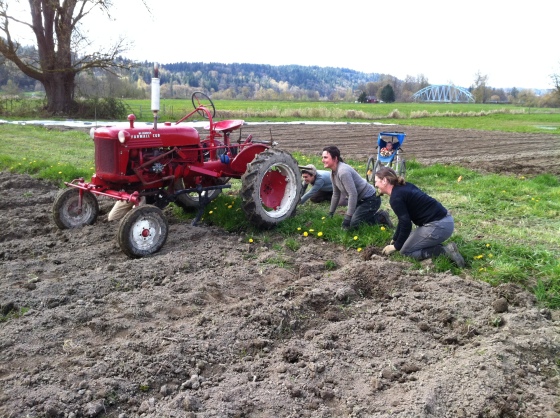
Marisa, Rita, and Leah learning about cultivating with our vintage Farmall Cub.
Over the years, our farm workforce has evolved. We still hire a group of mostly novice farmers each year, but we also have a crew of experienced workers who know our farm systems and can be entrusted with a lot of the day-to-day management of the farm. For me and Jason, providing an entry point into a farming career for people without previous experience is very important. We, and most of the farmers we know, got our start working as apprentices or interns on other farms. It's a system that I sometimes jokingly refer to as the "apprentice pyramid scheme," but in reality, it is the most consistent and effective means for a would-be farmer to learn the practical skills needed to start his or her own farm. Our own farm has now grown to the point where we need several experienced veteran managers and crew leaders to get all the work done, but we also recognize that everyone has to start at the beginning somehow.
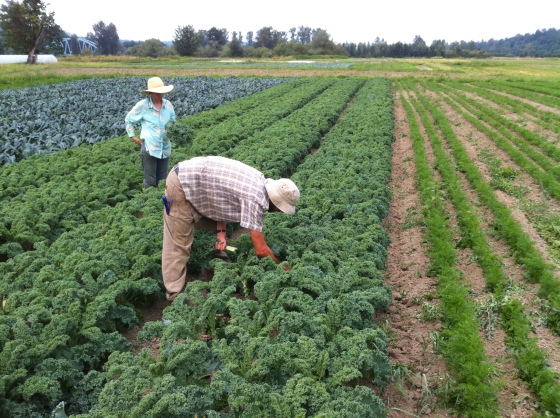
Kyli and Rawley bunching kale.
Over the last seven years, we've had about thirty people spend all or part of a growing season working as part of our farm crew. As of today, eleven of them own farm businesses of their own. Here they are, from newest to oldest:
Annie Woods, Dark Wood Farm - LRF Class of 2013
Bonnie Briggs, Skinny Kitty Farm - LRF Class of 2013
Rawley Johnson , Early Bird Eggs - LRF Class of 2013
Leah Wymer, Bloom San Juan - LRF Class of 2012
Brady Ryan, Ryan Farms & San Juan Sea Salt - LRF Class of 2012
Anna Metscher, Wild Ridge Farm - LRF Class of 2010
Rand Rasheed, One Leaf Farm - LRF Class of 2010
Paul Simoneau, One Leaf Farm - LRF Class of 2010
Eli Hersh, Duffy Hill Farm - LRF Class of 2009
Larry and Michelle Lesher, Eastward Gardens - LRF C0-founders and 2007-2008 farm partners
Whether our "alumni" go on to careers in farming or take another path in life, their experiences with us inevitably shape the way they think and interact with the world. Farming, from the outside, may look like a series of mindless drudgery tasks, but in fact each job that we do takes skill and training. Farmers and farm workers learn to look at a problem or a task, weigh the possible solutions, evaluate their own capability to alter the situation, and take the appropriate actions.
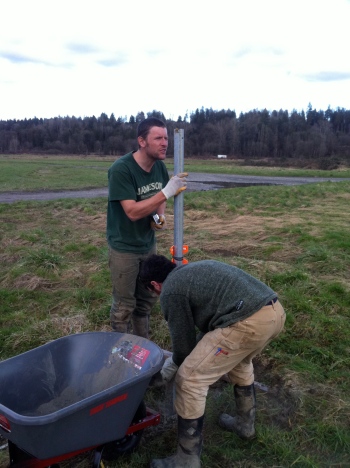
Brady and Jason setting posts on our seedling greenhouse.
A farmer I know classified people as those who are "able to change the corporeal world" and those who are not. In today's world there are fewer and fewer people who have the skills and self-confidence to change the corporeal world, yet many of our greatest challenges as a culture require us to think of novel ways to interact with that world in new and challenging ways. We need to think differently about how we manage water, how we build the environment where we live, how we manage natural resources of all kinds. People who have spent time on diversified farms are well equipped to combine practical knowledge and intellectual rigor to solve this type of problem. The world needs more farmers. We're working on it!
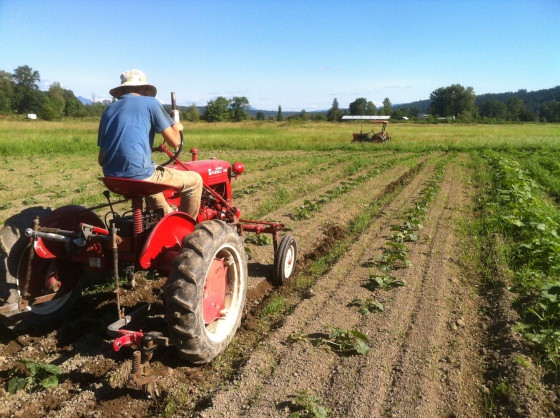
Sam cultivating potatoes.
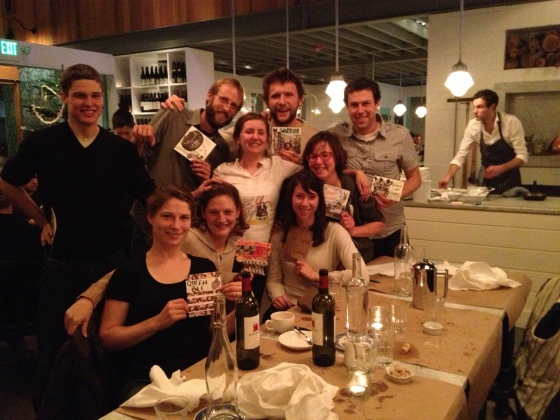
Our standout class of 2012. All these folks still work at Local Roots or run their own farms. And Cara.




